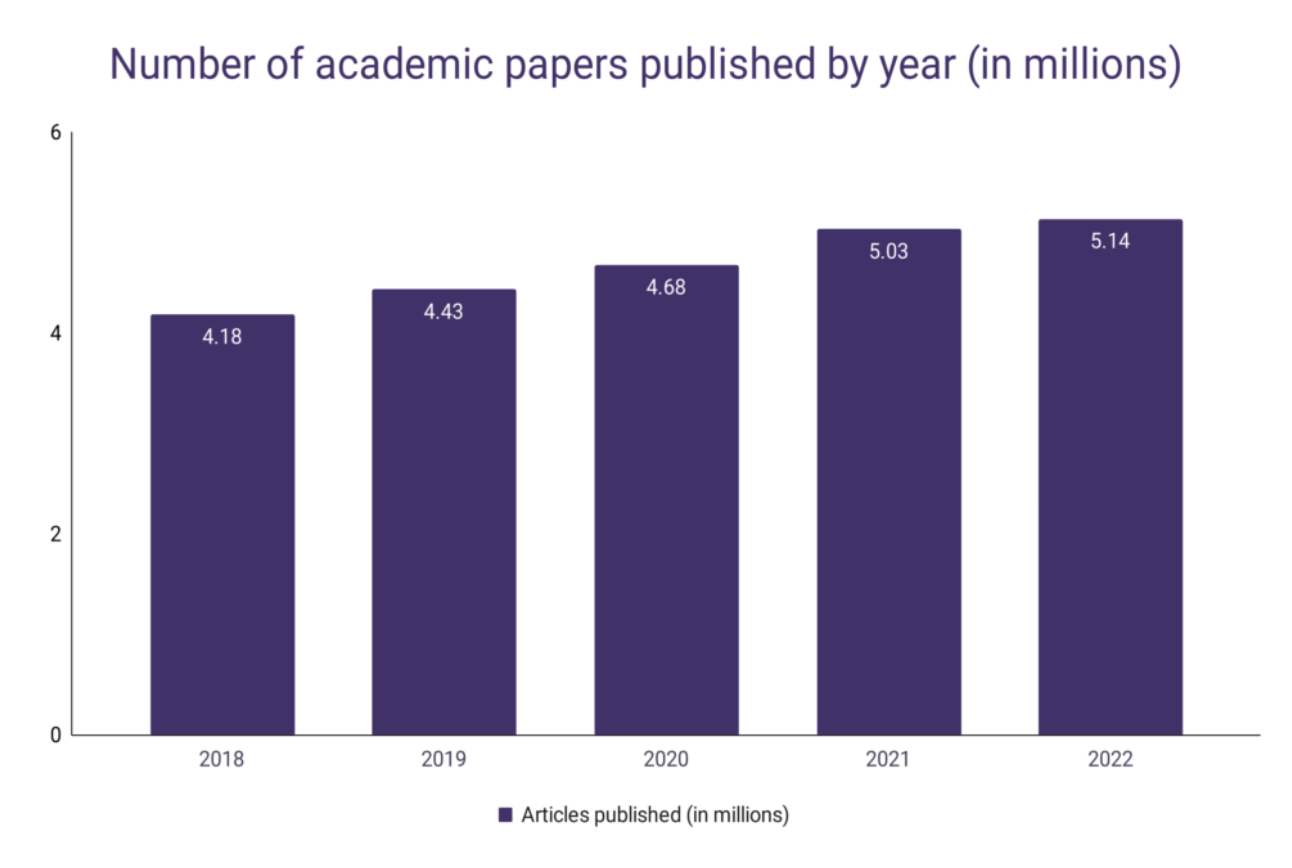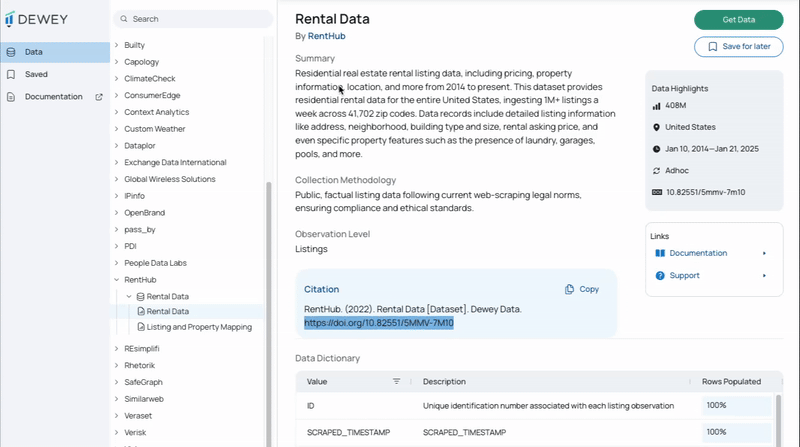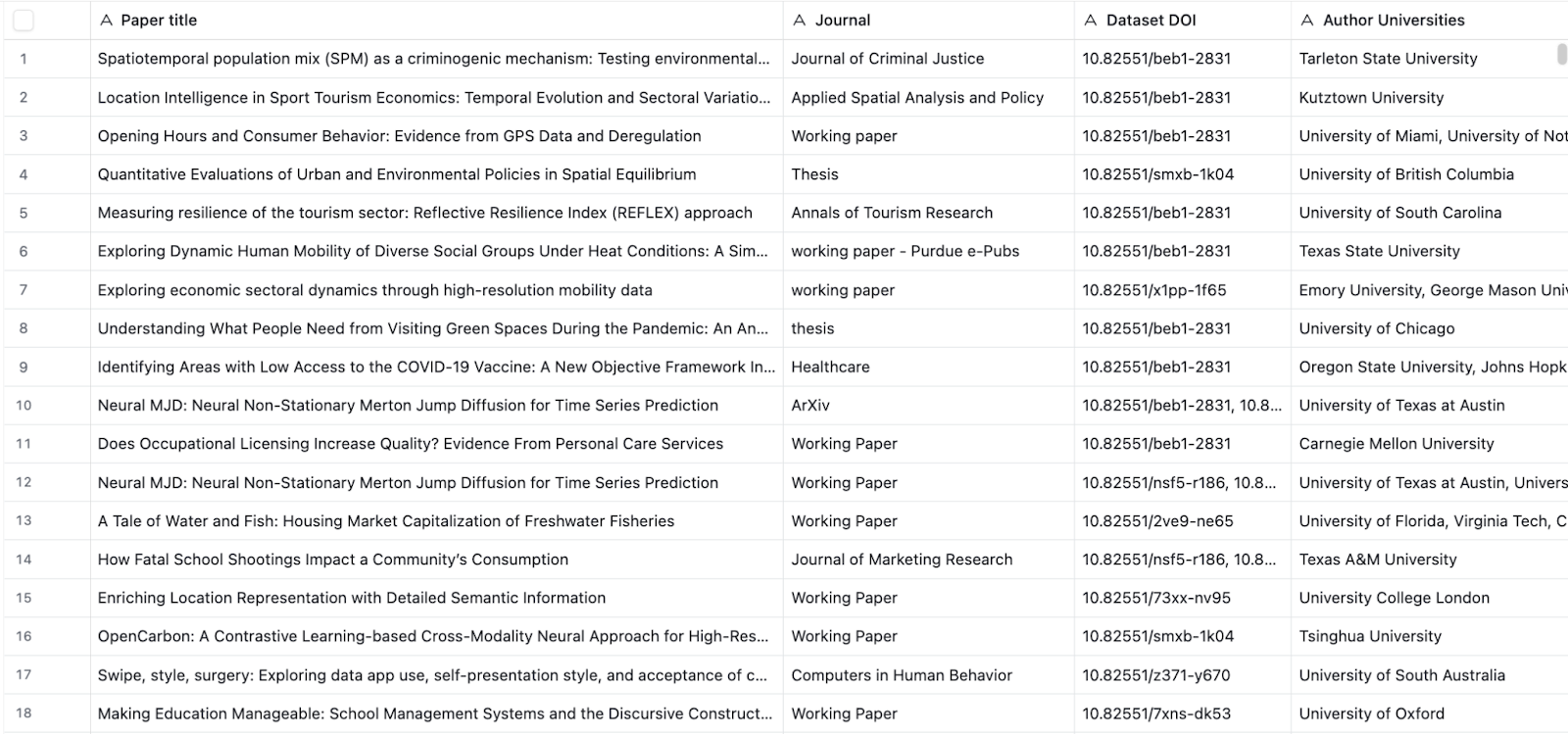Why DOIs Matter for Data Providers
If you’re a commercial data provider, academic research probably isn’t at the top of your priority list, and that’s fair. Most teams are focused on customer acquisition, revenue growth, and product development. Academic citations aren’t exactly front-page KPIs.
But here’s the thing: when your data does get cited in academic research, it’s a big deal, and it’s a missed opportunity if no one knows it happened.
At Dewey, we work with data providers who are just starting to tap into this idea: academic research is one of the most underutilized brand marketing channels for data companies. But to benefit from that exposure, your data needs to be discoverable, citable, and attributable.
That’s where Digital Object Identifiers (DOIs) come in.
The Real Value of Academic Citations
In 2022, over 5.14 million scholarly papers were published globally across all fields including journals, conference proceedings, reviews, and surveys. (source)

Academic research doesn’t just live in journals anymore. It shapes policy, informs industry trends, and shows up in major media outlets. When your dataset is used in a research paper, it can become part of a broader conversation, and a powerful endorsement of your data’s credibility.
In fact, academic studies that cite real-world data vendors often act as trust signals. They show that your data is:
- Relevant to cutting-edge analysis
- High quality and fit for rigorous use
- Influencing real outcomes in business, government, or science
But none of that matters if your dataset gets cited as “proprietary data from an unnamed vendor” or “data from an unlinked source.” If there’s no clear way to trace it back to you, the value evaporates.
DOIs: Your Signal to the Research World
Digital Object Identifiers solve that problem.
When a dataset has a DOI, it’s easier for researchers to cite it properly, and for others to trace that citation back to you. It’s the difference between getting named and linked in the research, and disappearing behind a generic footnote.
Here’s why that matters to you as a data provider:
1. DOIs Make Your Brand Discoverable in Academic Research
A DOI isn’t just a link. It’s an entry point into the research ecosystem.
When your data is cited with a DOI, it becomes trackable across academic papers, institutional repositories, and discovery platforms like Google Scholar, SSRN, and OpenAlex. While your dataset or brand name may or may not appear in search results, a unique alphanumeric code always does. That makes it easier for researchers, journalists, and potential customers to discover and recognize your brand as a trusted source.

It’s not just about citations, it’s about visibility.
2. DOIs Create a Permanent, Credible Signal
DOIs provide persistent, stable identifiers that won’t break when your website changes or product URLs get updated. That permanence builds trust with researchers and gives your data institutional weight.
This is especially important in enterprise sales. When a researcher uses your dataset and cites it correctly, it becomes a third-party validation that can support sales conversations, public sector engagements, or even VC fundraising.
3. DOIs Make It Easier to Track Impact
Once a dataset has a DOI, you can track how and where it’s being cited across the scholarly web.
At Dewey, we have already added dataset DOIs to our published research database. As more researchers cite datasets properly, we can surface these mentions early, often while a project is still in the working paper stage, long before it is formally published.
This means you won’t have to wait for a Google alert. Instead, you get proactive insight into who is using your data and how.

4. DOIs Unlock More Than Just Academia
As we’ve written before: academic research is the new brand marketing channel for data companies. But what many data providers overlook is how academic use can unlock other audiences.
Academic researchers don’t just validate your data, they often introduce it to:
- Analysts at research firms
- Policymakers and regulators
- Enterprise teams hunting for trustworthy sources
Many academics go on to work in government or corporate research roles. When they already know your dataset from their academic days, that familiarity can give your sales team a huge foot in the door.
DOIs enable this kind of long term relationship by making it easy to reference and share your data’s value, without the data itself being passed around.
5. Dewey Handles the DOI Work for You
For Dewey Data providers, we handle all the DOI infrastructure behind the scenes. When your dataset is listed in our platform, we work to mint the DOIs with the correct metadata and notify all researchers of best citation practices.
You don’t need to host landing pages, build metadata pipelines, or learn new citation standards. We take care of it, because we believe that surfacing the value of your data should be simple.
Final Thoughts
Academic research likely isn’t your core business, but when your data shows up in scholarly work, it’s a sign that you’re producing something credible, useful, and impactful.
DOIs make sure that signal gets out into the world.
They connect your data to the scholarly record, make your brand more discoverable, and help you measure your influence in places you may not be looking yet.
Want to see where your data is showing up in research? Let’s talk: Partner with Dewey
